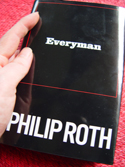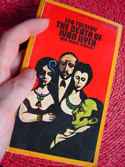The GoodShortNovels.com Review--One Recent Release and One Classic
Death Knells
EVERYMAN and THE DEATH OF IVAN ILYCH
Reviewer: Stedman Mays
Recent Release
 EVERYMAN by Philip Roth. Houghton Mifflin, 2006. Hardcover. 182 pages of the text of the novel, which is set in an easy-to-read font with ample margins and line spacing. Estimated length of the novel: around 40,000 words.
EVERYMAN by Philip Roth. Houghton Mifflin, 2006. Hardcover. 182 pages of the text of the novel, which is set in an easy-to-read font with ample margins and line spacing. Estimated length of the novel: around 40,000 words.
We all have to die sometime, as the saying goes. For most of us, that sometime will be when we succumb to disease or old age or, in the most likely scenario, a little of both. Our decay might not be very glamorous, exciting, or climactic in the manner of crime novels or other types of commercial genre fiction, where murders and unusually violent circumstances provide sensationalistic drama. But a more gradual decline from natural causes is a truer, if drearier, depiction of what awaits the average person.
Philip Roth's EVERYMAN is the story of an older retired man's angst in the face of his own mortality. The unnamed protagonist is in his seventies, and the end of the road is clearly in view. He's had a series of heart and circulatory problems, for which he's already been through several operations.
The book actually begins with his funeral and then we are told the story of his life in flashback, mostly from the perspective of the man's last remaining years as his body is being racked by poor health and as he is longing to recapture something of his earlier physical and sexual prowess. We hear many reminisces about his past, basically giving us a portrait of a man whose successful career as an art director and creative director at an important New York City-based ad agency is in sharp contrast to his failure as a father and husband to numerous divorced wives. To make matters worse, when he retires from his advertising work to became a full-time painter, he comes to realize that he has settled in a rather sterile retirement community on the Jersey Shore, where he starts to lose faith in his talent as a painter. He feels isolated and there's no one to confide in. And he's regretful about all his busted-up relationships from the past. In the end, he can't even reach out to and be completely honest with his only daughter, the one child of his who has tried to be supportive of him in his later years (his two sons from another marriage are wilfully distant and out of the picture, because they feel their father wronged their mother).
The premise of the book--his grappling with the emotional wasteland of a life he has inadvertently created for himself--is conceptually elegant, almost classical, in its focus. One is put in mind of the great "end-drawing-near abysses" of the literary canon, everything from Shakespeare's King Lear to Tolstoy's The Death of Ivan Ilych to the medieval play Everyman, the title of which Roth recycles for the title of his own novel.
But the narrative is only as good as its details and the way in which those details unfold for the reader. Roth's execution of the story (or should I say, his omniscient narrator's telling of the story) is uneven. EVERYMAN is marred by moments of pretentious dialogue ("The utter otherness of it is awful") and a reluctance to carefully and patiently examine the emotions, thoughts, and memories of the protagonist (for example, his wives and alienated sons come off pretty much as stock characters--they could have been used in the narrative in more compelling ways). There's a glib, made-hastily-for-TV quality to the writing. And the quote from a Keats poem that Roth chooses as an epigraph is fine in and of itself, but seems strained and overblown as an opening to the novel.
The use--or I should say overuse--of exclamation marks is also a weak point. The first example of Roth's bad case of exclamation-itis:
"I'm thirty-four! Worry about oblivion, he told himself, when you're seventy-five! The remote future will be time enough to anguish over the ultimate catastrophe!"
As if this weren't bad enough, another instance (in the dialogue of one of his wives):
"'The pitiful middle-aged wife, embittered by rejection, consumed by rotten jealousy! Raging! Repugnant! Oh, I hate you for that more than anything. Go away, leave this house. I can't bear the sight of you with that satyr-on-his-good-behavior look on your face! You'll get no absolution from me--never! I will not be trifled with any longer! Go, please! Leave me alone!'"
And still more:
"My God, he thought, the man I once was! The life that surrounded me! The force that was! No 'otherness' to be felt anywhere!"
Philip, honestly, how could you!!! Seriously, this kind of amateurish excess of exclamation points should be a cautionary tale for any writer who might be tempted to emulate what Roth is doing in these passages, which are not only poor writing but glaring examples of poor punctuation. Exclamation marks should be used sparingly unless something about the text cries out for some kind of super-extravagant flamboyance or the text consists of an extended shouting spree (punctuation rules are made to be broken, of course, but there better be a good reason for breaking them). Too many exclamation points in rapid succession can be deadly. Of the three examples quoted above, perhaps the second is the most defensible since his wife is obviously upset and her voice has risen, but even that would be a better passage if the melodramatic dialogue were revised and there were fewer exclamation points.
Late in the book, however, there are some affecting passages on his loneliness and his sense of futility. When the protagonist visits the cemetery where his parents are buried and he seems to be grasping for a source of vitality as he nears their graves, it's hard not to feel empathy. But, for both the protagonist and the text of EVERYMAN, it's too little too late.
Classic Revisited
 THE DEATH OF IVAN ILYCH by Leo Tolstoy. Translated from the Russian by Aylmer Maude. Signet, 1960 (first published in Russian in 1886). Paperback. 62 pages of the text of the novel, which is included in a collection of Tolstoy's shorter fiction. Estimated length of the novel: around 22,000 words.
THE DEATH OF IVAN ILYCH by Leo Tolstoy. Translated from the Russian by Aylmer Maude. Signet, 1960 (first published in Russian in 1886). Paperback. 62 pages of the text of the novel, which is included in a collection of Tolstoy's shorter fiction. Estimated length of the novel: around 22,000 words.
Reappraising relationships is something we all do from time to time, even if only subconsciously or in secret. But for the terminally ill, time is running out. If there's any reappraising to be done, they have to get on with it in short order.
Ivan Ilych is a judge who spends his professional life issuing judgments for others, but, ironically, he hasn't had very perceptive judgment of himself or of people in his personal life. When he becomes ill and the end of his life is imminent, he starts to see what a sham many of his relationships and assumptions about his day-to-day existence have been. The novel is about his quiet horror as he recoils from many of the everyday rituals and interpersonal connections that he had relied on previously to give his life meaning.
It's a chilling tale about the corrosiveness beneath the surface of polite facades and superficial good will--and one of the best works in Tolstoy's canon. Once read, it's impossible to forget. I can't imagine anyone finishing THE DEATH OF IVAN ILYCH and not taking at least a moment or two to reflect on the quality of her or his existence and relationships. Simply put, the book makes you contemplate whether people really care about you or not. I think it's a question worth asking and thinking about. It may seem like an obvious question, but it's easy to get sidetracked in the busyness of everyday life and neglect the obvious. Distractions are more pleasant than facing the truth about hollow or abusive relationships and dysfunctional modes of being.
THE DEATH OF IVAN ILYCH has been highly influential for generations of creative artists, but perhaps the greatest movie it has inspired is the Japanese director Akira Kurosawa's Ikiru (translated usually as Living or To Live). Kurosawa is best known for classic films such as Rashomon, Seven Samurai, High and Low, and Ran, but a strong case can be made for Living as his masterpiece. Meticulous in its observation of character--by turns amusing, alarming, and heartbreaking--Living is the least sensationalistic and yet the most touching of Kurosawa's works. The lead actor, Takashi Shimura, one of Kurosawa's favorite players, gives one of the iconic performances of post-World War II cinema (the movie was released in 1952). It's the savoring of little moments, as well as the slowness of pace, that engages us--Shimura walking down the street in his oversized coat, his preparations for bed, his shuffling of stacks of papers on his tiny desk area as he sits in his office surrounded by mountains of bureaucratic documents, the delight he takes in wearing a new hat, his sudden glimpse of someone's tattered stockings, and his gentle swaying back and forth on a swing in a deserted playground. All of this is presented with visual flair--some of the best black-and-white photography in the history of cinema--and a profound sensitivity to the seemingly mundane details that make us who we are.
For the current edition of the GoodShortNovels.com Review, click here
Copyright 2006 Scribblers House® LLC New York. All rights reserved.